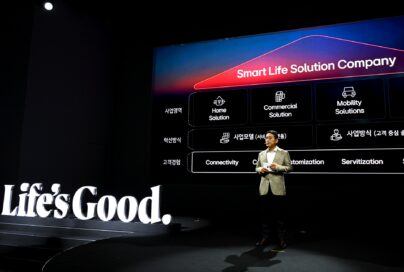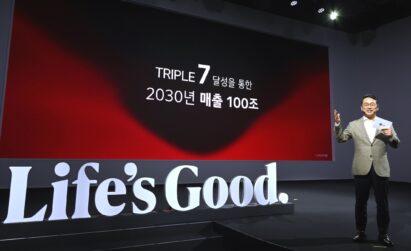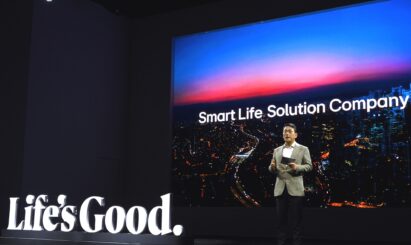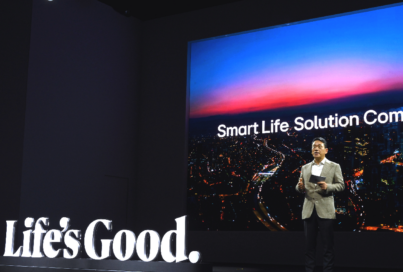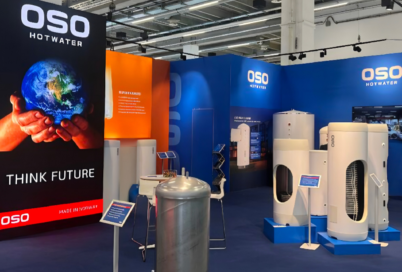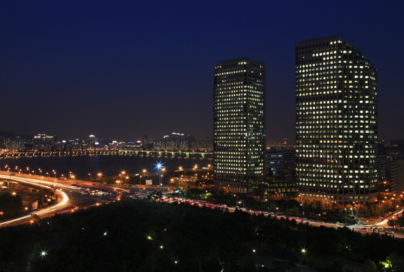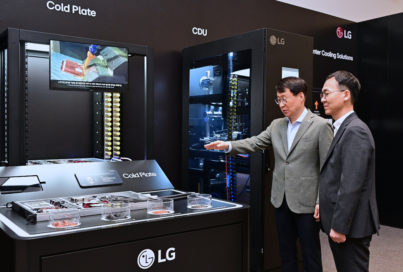Key Elements of LG’s Bold Vision to Transform LG Into ‘Smart Life Solution Company’
Company Pursues New Growth Engines,
Enhancing Customer Experience at Every Contact Point
LG will innovate with a platform-based service business model that continuously generates profits, such as content and services, subscriptions and solutions, to the hardware-oriented businesses, which generate sales and profits at the time of purchase. This is part of the company’s attempt to create a business model centered on customer engagement, combining services with hundreds of millions of LG devices used by customers around the world.
To start, as of the end of this year, LG’s TV business is projected to make a great transformation based on its webOS operating system, which powers more than 200 million smart TVs around the world. In line with this, the company intends to transform its TV business portfolio into a “media and entertainment service provider” by expanding content, services and advertisement in products, including LG OLED and LG QNED TVs, which have differentiated competitiveness.
The company will invest more than KRW 1 trillion over five years to strengthen the content competitiveness and drive growth of LG Channels – an advertising-based free broadcast platform. LG Channels increased from 20 million users in 25 countries last year to 48 million users in 29 countries this year. To achieve quantitative growth, LG will expand customer contact points by increasing the supply of the webOS platform to external TV brands and expand the application of webOS to other product groups.
Household appliances are also speeding up the transformation of service-based portfolios. The goal is to further evolve LG ThinQ UP appliances that upgrade functions customers need even after purchase and evolve into a “Home as a Service” platform that combines hyper-personalization, subscriptions and smart home services. LG ThinQ will support the emerging home solutions business that encompasses the entire house by adding services that customers need in the home complementing connected devices.
The home appliance rental and care service business is also expanding to include all services necessary for spaces in the house, including product maintenance, management and cleaning. The compound annual growth rate of LG’s rental and care service sales has exceeded 30 percent over the past five years.
Accelerating the expansion of its B2B businesses, the company aims to evolve its electric vehicle (EV) business into a top electric component part provider worth more than KRW 20 trillion by more than doubling sales by 2030. Responding to trends, such as vehicle electrification and connected services, LG is actively seeking new opportunities in future mobility areas, such as autonomous driving, software solutions and content. The order backlog of LG’s Vehicle component Solutions Company is expected to reach KRW 100 trillion by the end of the year, showing the competitiveness of the business.
By 2030, LG aims to double sales for its heating, ventilation and air conditioning (HVAC) business and become a global top-tier comprehensive air conditioning company. The company also plans to discover inorganic strategies, such as completing mergers and acquisitions and making equity investments. The company is establishing a localized business structure that covers research and development, production, sales and maintenance of air conditioning projects in major regions such as North America and Europe. Also, LG will preemptively prepare for the future in energy service sectors, such as energy storage systems, home energy management systems and virtual power plants.
In the case of built-in home appliances, the company will expand markets in North America and Europe, which account for more than 70 percent of the global market and foster LG to become one of the top five built-in appliance brands. Commercial displays provide customized solutions for each specific customer group and secure growth momentum.
Over the past two years, considering market conditions and evolving business model strategies, the company boldly exited its mobile phone and solar panel businesses and, instead, focused resources on future high-growth areas. In the future, LG plans to accelerate future development by selecting and concentrating on new businesses that are expected to have similarly high growth potential.
The company is also continuing its strategic investment in digital healthcare, a key focus of the North American Innovation Center known as LG NOVA based in Silicon Valley, California. The scale of investment in LG NOVA is also on the rise. Among other LG NOVA-led initiatives, LG is providing remote medical treatment solutions in North America through the partnership with Amwell, a U.S. telemedicine company. In the future, the company will consider expanding its services through strategy investment to preventative and follow-up management.
LG’s EV charging business has an aim to provide an integrated solution that encompasses the control area, not just the sales of chargers. The company recently launched four products in South Korea through its affiliate company HiEV Charger and will expand markets to Europe and Asia next year. LG also plans to start building additional production bases within the year to target the North American market.
The company is also establishing a wide range of strategic collaborations in the metaverse. Mixed Reality devices are continuously being developed jointly with leading global platform companies, while the development of Augmented Reality devices is underway at the Korean Ministry of Science and ICT’s project to advance the development of AR Glass Advancement and the building of content production ecosystem. Various efforts are also being made to provide a more immersive experience on large screens, such as TVs.
Breaking Business Limitations via Full Potential Strategy
LG has been operating a company-wide task force to preemptively respond to changes in the business environment. The task force aims to not only reduce short-term costs but also promote fundamental changes in business structure and methods to maximize business potential, securing suitable profit levels and promoting sustainable growth despite prolonged economic uncertainty.
These efforts have contributed greatly to LG’s performance as well. The company’s sales and operating profit in the second quarter of 2023 were the highest ever for the second quarter. In the first half of 2023, the company recorded the second highest sales ever and the third highest operating profit. These tangible results were achieved by improving the fundamentals of the business despite the prolonged slump in global demand.
LG believes that, in order to innovate the customer experience (CX), a company needs to advance digital transformation (DX) as it is essential to have a data-based understanding of customers to reflect hidden needs – which customers may not be aware of – in products and services. In this regard, the company is making efforts to combine CX and DX to make a business model to better communicate with customers by establishing various points of contact, provide a never-before-seen CX, build organizational capabilities to research and plan differentiated CX and innovate experiences throughout the customer experience journey.
To expand customer contact points, LG will strengthen direct-to-consumer (D2C) sales through LGE.com, the company’s online brand shop, and increase operation of pop-up stores to interact with the younger generation, including Gen Z. The number of visitors of pop-up stores throughout Korea since last year adds up to 600,000.
To plan and develop new products, the company actively utilized systems internally to understand customers based on data and discover hidden needs. This includes “Lifegraphy,” a customer data analysis system, and “IC 360 (Intellytics Customer 360),” a company-wide platform that integrates and manages customer data collected from all customer contact points.
In addition, in terms of organizational capabilities, LG is defining and applying its core customer experiences to products and services through customer behavior research led by the CX Center. The company is actively making changes in customer-centric working methods, with employees voluntarily participating in campaigns to define ‘customers’ and ‘customer value.’
Spreading Change Across Organizational Culture and Brand to Business Strategy
Internally, REINVENT LG, an organizational culture innovation campaign, was put in place to change the way of working and communicating at LG. By doing this, the company hopes to reinvent the brand by having employees lead changes themselves.
Transformations have also been made to bring a dynamic and youthful look to the brand at customer contact points. Changes that redefine the brand’s core values – Uncompromising Customer Experience, Human-Centered Innovation and Warmth to Power a Smile – and add dynamism to LG’s visual identity are actively being made around the world.
Supporting the ESG vision of a Better Life for All, the company has made six core commitments: achieving carbon neutrality, circular economies, eco-conscious products, sustainable supply chains, an inclusive organizational culture, and accessible products and services.
In particular, LG plans to actively expand various activities that customers can engage in, enabling them to better relate to the company’s ESG vision and understand its meaning and significance. With ESG management not only focused on suppliers, LG’s vision also takes ESG to a new level to instill a sense of pride in consumers that they positively contributed to the environment by selecting LG’s products and services, providing an experience of increased convenience and usability.
# # #
